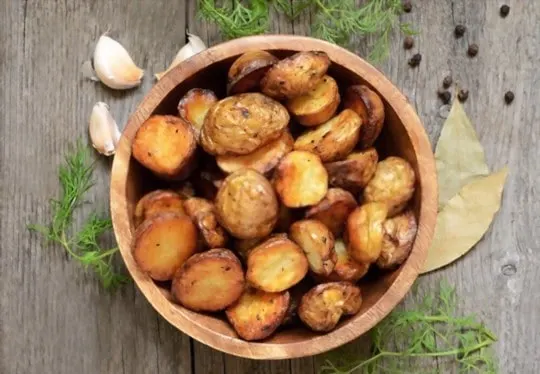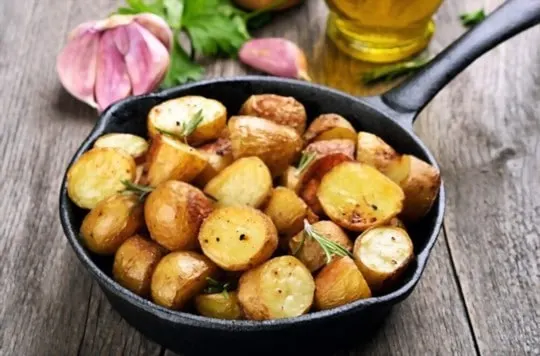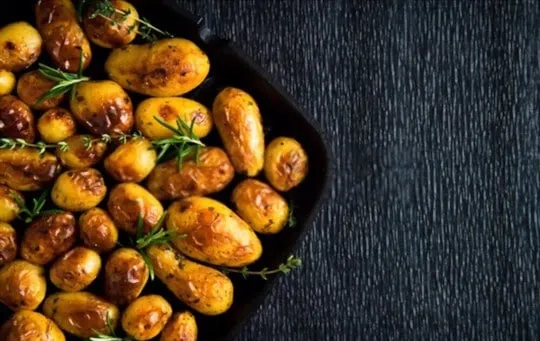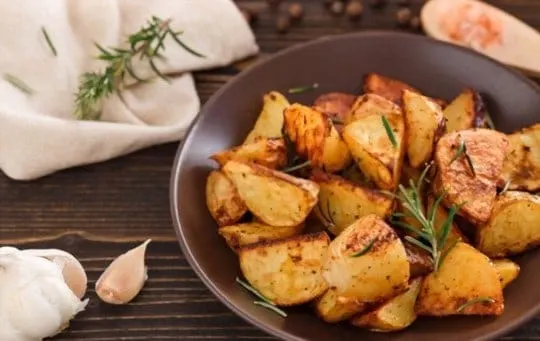Potatoes are among the most common vegetables and are popular with many families.
They have a huge range of cooking uses – from simple roast potatoes to potato salads, or even potato cakes.
They are a staple food in many recipes and are equally popular with young children or fussy eaters.
The popularity of potatoes is no surprise – they are straightforward to cook, it’s quick and convenient to prepare a meal using them, they’re healthy, nutritious, and versatile.
Roasting potatoes is a great way to prepare them – it’s simple, requires little effort, and produces fantastic results.
Roast potatoes are healthy and nutritious, but did you know that you can also freeze them?
It is surprisingly easy to freeze roast potatoes, which can prepare a meal even quicker and easier.
This can be a great help for anyone who gets little time to spare in the evening – if you prepare your frozen roast potatoes in the morning, then it will only take minutes to heat them before serving as an accompaniment or side dish to your evening meal.
You can freeze these at any cooking stage, but the best time is obviously before they are cooked.
This way, you won’t have to wait for them to defrost before serving – heat your frozen potatoes in a microwave or oven and serve as normal.
In this article, we will guide you through how to freeze roast potatoes.
We’ll also show you suggestions to go with them and provide a delicious recipe that you can use any time.
Does Freezing Affect Roast Potatoes?

As mentioned above, the best time to freeze your roast potatoes is as soon after preparation as possible.
This will ensure that you will have roast potatoes at your fingertips whenever you need them.
All you need to do is keep a small number of roasted potatoes aside before starting the cooking process – this can be done on a separate plate or in a separate bowl for ease of separation.
The taste of frozen roast potatoes is unlikely to be affected much by the freezing process.
There will likely be a slight change in the texture of your roast potatoes.
However – they may not have quite as crunchy or crisp an exterior when you heat them after defrosting because some moisture will have been lost during the freezing and defrosting processes.
Freezing roast potatoes is easy – all you need to do is place your prepared potatoes into an airtight freezer bag.
If you can, it’s best to separate them into individual servings first so that when you want to use the frozen roast potatoes, they are at hand, ready for heating and serving.
How to Freeze Roast Potatoes?

Roasting potatoes are straightforward to prepare, and if you follow the correct cooking process, they should freeze well.
Once your roast potatoes are cooked, then all you need to do is freeze them.
It’s best to let them cool down first not to burn yourself when handling the hot potatoes.
Next, place them in an airtight freezer bag and make sure they are well separated from one another.
You can use a plate or bowl to divide your roast potatoes into individual servings before freezing for ease of separation later on if desired.
This will make separating the portioned potato portions much easier later on – try to remove any excess oil from the surface before freezing.
Make sure to label with the type of dish and cooking method used (i.e., potato salad, roast potatoes, or baked potatoes), date it, and place it in the freezer.
Here’s a step-by-step guide to freezing your roast potatoes:
- Let the potatoes cool down completely before placing them in the freezer.
- Separate your potatoes into serving portions and transfer to freezer bags or containers.
- Label your dishes and store them in a freezer for up to three months, depending on the type of potatoes (check the packaging).
How to Thaw and Reheat Frozen Roast Potatoes?

Once you have frozen your potatoes, it is straightforward to defrost and reheat them whenever you want.
If some of those meals keep well for a few days, they can be cooked early in the week or at the weekend so that they are ready when you need them.
The first step in this process is to allow your roast potatoes to defrost in the microwave or oven.
The speed of this depends on the type and quantity of potatoes you are frozen, so it’s best to note down how long you have allowed them to thaw for each time – this way, you won’t get confused next time around.
It will take around fifteen minutes to thaw 500g of roast potatoes in the microwave on full power, so be patient and allow them to defrost naturally.
Once they are soft, you can quickly reheat them using the same method as you do when preparing freshly-cooked ones – heat through until piping hot (about 8 minutes).
If you need to reheat them using the oven, heat up to 220°C/Gas Mark 7 and cook on a high setting for about 20 minutes.
The best thing about roast potatoes is that they can be enjoyed with many meals – from simple cheese and (or) bacon dishes to hearty casseroles or hotpots.
What to Serve with Thawed Roast Potatoes?

Roast potatoes are incredibly versatile – they can be enjoyed with all kinds of different meals, from the simple to the hearty.
Oh, and did I mention that you can also make delicious roasties in the oven? I like serving mine with fish pie or a rich chicken casserole.
Although they have been roasted already, the reheating process helps bring some lovely flavors and crispy edges that will undoubtedly leave you wanting more.
And then there are the classic roast potatoes served up with a Sunday lunch.
These are lovely served piping hot alongside delicious roasts, homemade soups, or creamy casseroles for an easy but tasty meal.
Try adding some tasty gravy and crispy bacon to your roasties for an indulgent Sunday dinner if it’s a special occasion.
Of course, if you are feeling creative, there is absolutely no reason you can’t serve your roast potatoes in something other than the classic roast potato dish.
They can be used for some phenomenal potato salads or even as a base for warm baked potatoes with cheese and bacon.
Conclusion
In conclusion, don’t throw out your roast potatoes.
Freeze them and enjoy their unique flavor at a later date, or make delicious roasties in the oven – either way, you’re sure to be thoroughly satisfied.
They are simple and easy to make, so why not try making a big batch of these delicious spuds to enjoy as part of your favorite meals?
If they aren’t eaten straight away, you can always freeze them for later on – remember to label them carefully.

Can You Freeze Roast Potatoes? The Complete Guide
Ingredients
- Roast potatoes
- Air-tight containers or Ziplock bags
- Labels and markers
Instructions
- Prepare all the mentioned equipment and ingredients in the article.
- Follow the steps for proper freezing.
- Label the container with the date and contents.
- Depending on the recipe, thawing time may vary.
